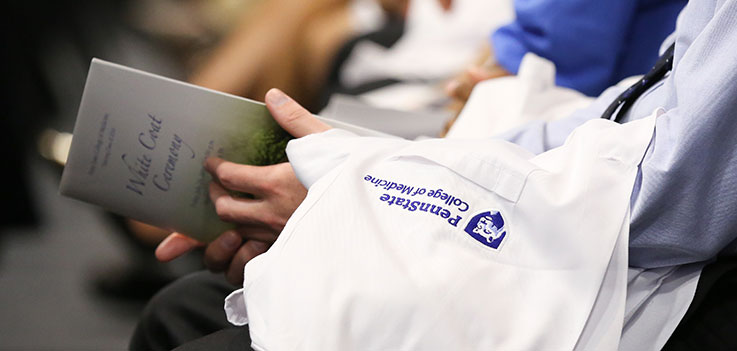MD Program - Application Requirements

MD Admission Requirements
The College of Medicine seeks high-performing students with a background in the sciences as well as a liberal education in humanities and the arts.
See the application materials we require, and learn what to expect during the interview process.
Prerequisites for Admission
Penn State College of Medicine is committed to developing tomorrow’s diverse group of humanistic, systems-thinking physicians who will serve a broad spectrum of communities and lead in many areas of our health care system. We seek applicants who come to medicine with a passion to serve and a commitment to excellence and life-long learning. We seek students who bring a full, rigorous and holistic background of study and experiences to medical school.
We accept students with good standing backgrounds who are, or will be, graduates of accredited colleges and universities in the U.S. or Canada before matriculation to Penn State College of Medicine. There are no restrictions on the type of major a student selects who meets expectations in the designated prerequisite areas outlined below. The Medical College Admissions Test (MCAT) is required and used in a holistic manner with other aspects of the application in the selection process. The admissions committee considers MCAT scores from the last three years prior to the year of matriculation. For example, to apply for the entering class of 2025, you will need to submit MCAT scores no earlier than 2022.
Prerequisite Preparation For Admission
Penn State College of Medicine recognizes that its applicants bring varied and rich undergraduate academic and personal experiences to their admissions credentials.
We recognize that students most successful in our rigorous curriculum demonstrate excellence in coursework in the areas that strengthen their academic preparation.
Specific academic courses (or the applicant’s institution’s equivalent) that are strongly recommended include:
- General biology with lab (1 year/2 semesters)
- General/inorganic chemistry with lab (1 year/2 semesters)
- Organic chemistry with lab (1 year/2 semesters)
- Physics with lab (1 year/2 semesters)
- Biochemistry (1 semester)
- Statistics course (1 semester)
Academic courses that are recommended include:
- Human anatomy and physiology with lab or equivalent (1 year/2 semesters)
- Microbiology (1 semester)
- Behavioral and social science courses (anthropology, economics, ethics, history, sociology, psychology, philosophy)
- Humanities courses (art, drama, literature, languages, music)
Online coursework is generally not recommended. Consideration is given to online coursework taken during the height of the COVID-19 pandemic (2020, 2021).
Courses that have Pass/Fail, Credit/No Credit, Satisfactory/Unsatisfactory as their grading are generally not recommended. However, consideration of this grading is given to coursework taken during the height of the COVID-19 pandemic (2020, 2021). It is recommended that applicants achieve a C or higher in the strongly recommended courses.
Applicants are required to complete a minimum of three years of post-secondary study at an accredited U.S. and/or Canadian college or university.
Completion of the baccalaureate degree from an accredited U.S. or Canadian college or university is required.
In addition to the above course requirements, Penn State College of Medicine expects applicants to demonstrate achievement of interpersonal and intrapersonal competencies as described within the AAMC Core Competencies for Entering Medical Students.
Applicants should have engaged in in-depth study based on the AAMC-HHMI Scientific Foundations for Future Physicians and AAMC Behavioral and Social Science Foundations for Future Physicians.
Advanced Placement Coursework
Penn State College of Medicine recognizes Advanced Placement (AP) courses for course requirements only if they appear as earned credits on the applicant’s college transcript.
Contact Us
If you have any questions about the MD Program admission requirements, please contact us at 717-531-8755 or StudentAdmissions@pennstatehealth.psu.edu.
